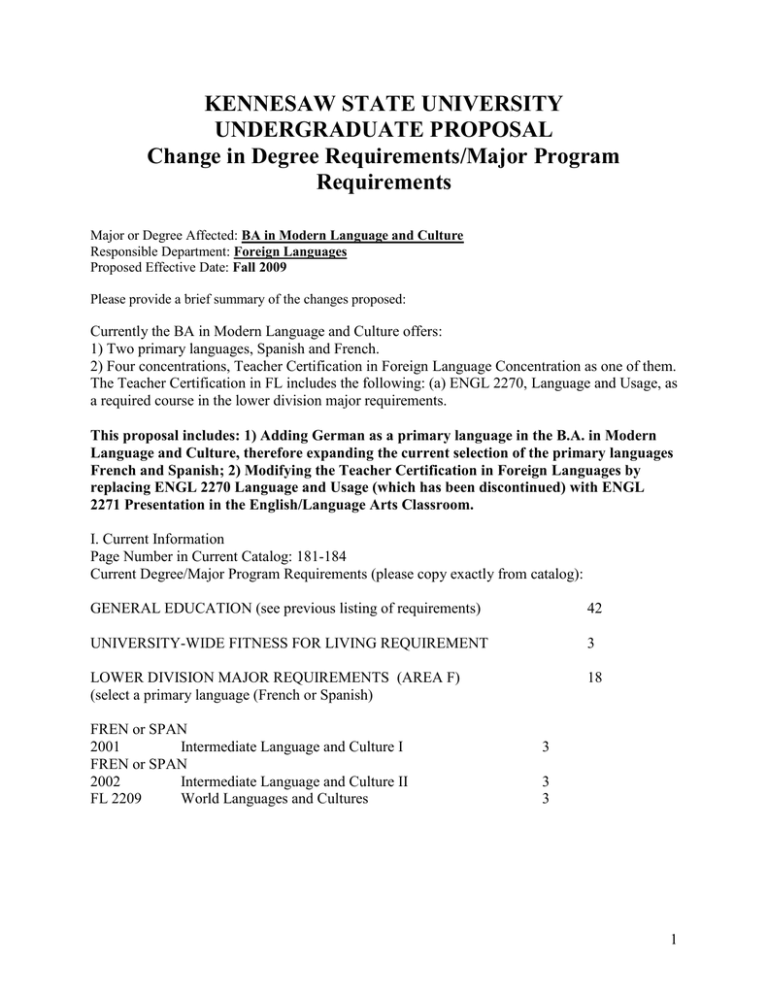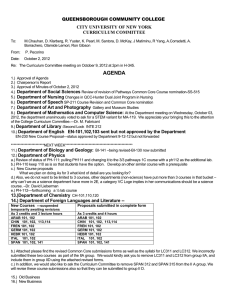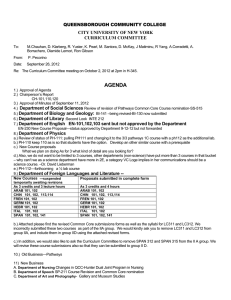KENNESAW STATE UNIVERSITY UNDERGRADUATE PROPOSAL Change in Degree Requirements/Major Program Requirements
advertisement

KENNESAW STATE UNIVERSITY UNDERGRADUATE PROPOSAL Change in Degree Requirements/Major Program Requirements Major or Degree Affected: BA in Modern Language and Culture Responsible Department: Foreign Languages Proposed Effective Date: Fall 2009 Please provide a brief summary of the changes proposed: Currently the BA in Modern Language and Culture offers: 1) Two primary languages, Spanish and French. 2) Four concentrations, Teacher Certification in Foreign Language Concentration as one of them. The Teacher Certification in FL includes the following: (a) ENGL 2270, Language and Usage, as a required course in the lower division major requirements. This proposal includes: 1) Adding German as a primary language in the B.A. in Modern Language and Culture, therefore expanding the current selection of the primary languages French and Spanish; 2) Modifying the Teacher Certification in Foreign Languages by replacing ENGL 2270 Language and Usage (which has been discontinued) with ENGL 2271 Presentation in the English/Language Arts Classroom. I. Current Information Page Number in Current Catalog: 181-184 Current Degree/Major Program Requirements (please copy exactly from catalog): GENERAL EDUCATION (see previous listing of requirements) 42 UNIVERSITY-WIDE FITNESS FOR LIVING REQUIREMENT 3 LOWER DIVISION MAJOR REQUIREMENTS (AREA F) (select a primary language (French or Spanish) 18 FREN or SPAN 2001 Intermediate Language and Culture I FREN or SPAN 2002 Intermediate Language and Culture II FL 2209 World Languages and Cultures 3 3 3 1 Select three courses from one of the following concentrations: Second Language and Culture (the language chosen must be different from the primary language) FREN or Beginning Language and Culture II GRMN or ITAL or SPAN 1002 (or higher) 3 FREN or Intermediate Language and Culture I GRMN or ITAL or SPAN 2001 (or higher) 3 FREN or Intermediate Language and Culture II GRMN or ITAL or SPAN 2002 (or higher) 3 OR Teacher Certification in Foreign Language COM 1129 Public Speaking FL or Beginning Language and Culture I CHNS or SPAN or FREN or GRMN or ITAL 1001 (or higher)* *(Must be different from the Primary Language) ENGL 2270 Language and Usage 3 3 3 OR Applied Business ACCT 2100 Introduction to Financial Accounting ECON 2100 Principles of Microeconomics or ECON 2200* Principles of Macroeconomics (*If ECON 2100 already taken in General Education) BLAW 2200 Legal and Ethical Environment of Business 3 3 3 OR Cross-disciplinary Perspectives (choose three of the following courses) ARH 2750 GEOG 1101 HIST 2206 HS 2233 Art History Survey World Regional Geography Origins of Great Traditions Overview of Human Services 3 3 3 3 2 UPPER DIVISION REQUIRED CORE COURSES (French or Spanish) French FREN 3200 Critical Reading and Applied Writing FREN 3302 Practical Conversation FREN 3303 Grammar and Composition FREN 3304 Literature and Culture I FREN 3305 Literature and Culture II FREN 3398 Internship or SA 4490 Study Abroad FREN 4402 FREN 4434 FREN 4456 FREN 4499 Contemporary Culture Topics in Literature, Language, and Culture Advanced Grammar and Linguistics Senior Seminar Spanish SPAN 3200 Critical Reading and Applied Writing SPAN 3302 Practical Conversation SPAN 3303 Grammar and Composition SPAN 3304 Literature and Culture I SPAN 3305 Literature and Culture II SPAN 3398 Internship or SA 4490 Study Abroad SPAN 4402 SPAN 4434 SPAN 4456 SPAN 4499 Contemporary Culture Topics in Literature, Language, and Culture Advanced Grammar and Linguistics Senior Seminar 30 3 3 3 3 3 3 3 3 3 3 3 3 3 3 3 3 3 3 3 3 OTHER REQUIREMENTS Select one concentration I. Second Language and Culture II. Teacher Certification in Foreign Languages III. Applied Business IV. Cross-disciplinary Perspectives Concentration I: Second Language and Culture 9 Select three 3000 level courses (or higher) within your second language (French, German, Italian, or Spanish) Concentration II: Teacher Certification in Foreign Languages EDUC 2110 Investigating Critical and Contemporary Issues in Education 3 36 3 EDUC 2120 EDUC 2130 INED 3304 FLED 3303 FLED 4410 FLED 4412 FLED 4413 FLED 4480 Sociocultural Influences on Teaching and Learning Exploring Teaching and Learning Education of Exceptional Students Second Language Acquisition Methods, Materials, and Curriculum in FLED P-8 Methods, Materials, and Curriculum in FLED 9-12 Field Experiences in FLED, P-12 Student Teaching in FLED, P-12 Concentration III: Applied Business MKTG 3100 Principles of Marketing MGT 3100 Principles of Management FREN 4404* Commercial French or SPAN 4404* Commercial Spanish (must be the same as the primary language) Concentration IV: Cross-Disciplinary Perspectives (choose three of the following courses: ANTH 3310 Cultural Diversity in the U.S. COM 3325 Intercultural Communication HIST 3305 The World Since 1945 PSYC 3355 Cross-Cultural Psychology 3 3 3 3 3 3 3 12 9 3 3 3 9 3 3 3 3 RELATED STUDIES (Applies to concentrations I, III, and IV only): 9 Nine hours of upper-division studies beyond the major requirements as approved by the academic advisor (for example, coursework toward the Certificate in Legal Interpreting). Lower division courses or additional internship or study abroad hours may also be approved when appropriate. FREE ELECTIVES (Applies to concentrations I, III, and IV only): Any courses in the University curriculum. PROGRAM TOTAL (concentrations I, III, and IV) : PROGRAM TOTAL (concentrations II) : 12 123 129 II. Proposed Information Include an outline of the entire program and please underline or otherwise highlight changes: GENERAL EDUCATION (see previous listing of requirements) 42 UNIVERSITY-WIDE FITNESS FOR LIVING REQUIREMENT 3 LOWER DIVISION MAJOR REQUIREMENTS (AREA F) (select a primary language (French or Spanish) 18 4 FREN or GRMN or SPAN 2001 Intermediate Language and Culture I FREN or GRMN or SPAN 2002 Intermediate Language and Culture II FL 2209 World Languages and Cultures 3 3 3 Select three courses from one of the following concentrations: Second Language and Culture (the language chosen must be different from the primary language) FREN or Beginning Language and Culture II GRMN or ITAL or SPAN 1002 (or higher) 3 FREN or Intermediate Language and Culture I GRMN or ITAL or SPAN 2001 (or higher) 3 FREN or Intermediate Language and Culture II GRMN or ITAL or SPAN 2002 (or higher) 3 OR Teacher Certification in Foreign Language COM 1129 Public Speaking FL or Beginning Language and Culture I CHNS or SPAN or FREN or GRMN or ITAL 1001 (or higher)* *(Must be different from the Primary Language) ENGL 2271 Presentation in the English/Language Arts Classroom 3 3 3 OR Applied Business ACCT 2100 Introduction to Financial Accounting ECON 2100 Principles of Microeconomics or ECON 2200* Principles of Macroeconomics (*If ECON 2100 already taken in General Education) BLAW 2200 Legal and Ethical Environment of Business 3 3 3 5 OR Cross-disciplinary Perspectives (choose three of the following courses) ARH 2750 GEOG 1101 HIST 2206 HS 2233 Art History Survey World Regional Geography Origins of Great Traditions Overview of Human Services 3 3 3 3 UPPER DIVISION REQUIRED CORE COURSES (French or Spanish) French FREN 3200 Critical Reading and Applied Writing FREN 3302 Practical Conversation FREN 3303 Grammar and Composition FREN 3304 Literature and Culture I FREN 3305 Literature and Culture II FREN 3398 Internship or SA 4490 Study Abroad FREN 4402 FREN 4434 FREN 4456 FREN 4499 Contemporary Culture Topics in Literature, Language, and Culture Advanced Grammar and Linguistics Senior Seminar Spanish SPAN 3200 Critical Reading and Applied Writing SPAN 3302 Practical Conversation SPAN 3303 Grammar and Composition SPAN 3304 Literature and Culture I SPAN 3305 Literature and Culture II SPAN 3398 Internship or SA 4490 Study Abroad SPAN 4402 SPAN 4434 SPAN 4456 SPAN 4499 Contemporary Culture Topics in Literature, Language, and Culture Advanced Grammar and Linguistics Senior Seminar German GRMN 3200 Critical Reading and Applied Writing GRMN 3302 Practical Conversation GRMN 3303 Grammar and Composition GRMN 3304 Introduction to Literature I GRMN 3305 Literature and Culture II GRMN 3398 Internship 30 3 3 3 3 3 3 3 3 3 3 3 3 3 3 3 3 3 3 3 3 3 3 3 3 3 3 6 or SA 4490 Study Abroad GRMN 4402 Contemporary Culture GRMN 4434 Topics in Language, Literature, and Culture GRMN 4456 Advanced Grammar and Linguistics GRMN 4499 Senior Seminar 3* 3* 3* 3* OTHER REQUIREMENTS Select one concentration I. Second Language and Culture II. Teacher Certification in Foreign Languages III. Applied Business IV. Cross-disciplinary Perspectives Concentration I: Second Language and Culture 9 Select three 3000 level courses (or higher) within your second language (French, German, Italian, or Spanish) Concentration II: Teacher Certification in Foreign Languages EDUC 2110 Investigating Critical and Contemporary Issues in Education 3 EDUC 2120 Sociocultural Influences on Teaching and Learning 3 EDUC 2130 Exploring Teaching and Learning 3 INED 3304 Education of Exceptional Students 3 FLED 3303 Second Language Acquisition 3 FLED 4410 Methods, Materials, and Curriculum in FLED P-8 3 FLED 4412 Methods, Materials, and Curriculum in FLED 9-12 3 FLED 4413 Field Experiences in FLED, P-12 3 FLED 4480 Student Teaching in FLED, P-12 12 36 Concentration III: Applied Business MKTG 3100 Principles of Marketing MGT 3100 Principles of Management FREN 4404* Commercial French Or GRMN 4404* Commercial German or SPAN 4404* Commercial Spanish (must be the same as the primary language) 9 Concentration IV: Cross-Disciplinary Perspectives (choose three of the following courses: ANTH 3310 Cultural Diversity in the U.S. COM 3325 Intercultural Communication HIST 3305 The World Since 1945 * 3 3 3 3 9 3 3 3 New course proposals submitted previously. 7 PSYC 3355 Cross-Cultural Psychology 3 RELATED STUDIES (Applies to concentrations I, III, and IV only): 9 Nine hours of upper-division studies beyond the major requirements as approved by the academic advisor (for example, coursework toward the Certificate in Legal Interpreting). Lower division courses or additional internship or study abroad hours may also be approved when appropriate. FREE ELECTIVES (Applies to concentrations I, III, and IV only): Any courses in the University curriculum. PROGRAM TOTAL (concentrations I, III, and IV) : PROGRAM TOTAL (concentrations II) : 12 123 129 III. Justification for Changes: (1) Justification to include German as a primary language in the B.A. in Modern Language and Culture, thereby adding to the current selection of the primary languages French and Spanish: German Studies at KSU has experienced an increase in a diversely qualified student body, including heritage speakers since approval of KSU German Studies Minor in 1999. Language proficiency of the student body enrolling in German has increased; therefore many students are no longer served well by offering the course selection of the minor in German Studies only. Student numbers in the upper-division German classes have increased and stabilized (currently 20-30 students enrolled in upper-division German). A poll conducted in a selection of lower- and upper-division classes showed that 25-50% of the students in those classes would consider the Modern Language and Culture degree with German as primary language, if it was offered. The growing Learn and Serve and Study Abroad programs in which German Studies faculty (Dr. Sabine Smith) are involved are continuously increasing the number of students interested in German as primary language in the Modern Language and Culture major. Metro Atlanta houses about 120 German companies and about 200 companies from German-speaking countries (40 companies in Cobb County) which hold internship and career opportunities for students holding a degree specializing in German. At this time, no new faculty lines are required for the addition of German as primary language. Currently, two tenure-track faculty members teach German Studies full-time, along with one tenure-track faculty member and one lecturer who fulfill 1/3 of their teaching assignments in German Studies. 8 (2) Justification to update the lower division major requirements for the Teacher Certification in Foreign Language concentration by replacing ENGL 2270 Language and Usage (which has been discontinued) with ENGL 2271 Presentation in the English/Language Arts Classroom: ENG 2270 is discontinued from course offerings of the Department of English. ENGL 2271 has been selected as a replacement for this course because the main objective of the Teacher Certification in Foreign Language concentration is to prepare students to meet the standards of our accrediting organizations and to develop strategies for becoming model teachers. These are also goals of ENGL 2271, as stated in the course description: ENGL 2271. 3-03. Prerequisite: ENGL 2110. Professional and community standards demand that English teachers model effective language arts skills and application. In this course, students will prepare for that role. They will study, practice, and apply the effective language strategies and skills needed to guide today’s English/Language Arts classrooms. Supporting Analyses of the Program – When degree or major program requirements or both are being revised, it is an opportunity to reconsider the relevance, effectiveness, and efficiency of the entire structure of the program. Following are some questions designed to provoke thoughtful evaluation of a program. If a program is being substantially revised, written responses to each of these items should be included as part of the proposal for the UPCC. If a minor change is being made to a program, writing out responses to all items is not necessary. However, UPCC members may ask about these issues during their evaluation of any proposal. 1. What are the primary learning outcomes of the program? Majors complete 30 semester hours of courses in a primary language that emphasize development of proficiency in speaking, listening, reading, writing, and culture, as well as content-specific courses in which students continue to expand and refine their linguistic, literary, and cultural competence. Upon completion of the program, all students are proficient in using the target language, are familiar with the target language system, and seek opportunities to further develop their skills and knowledge. In addition, students know the literature and culture of the target language countries. They use this knowledge to interpret and reflect upon the perspectives of the target culture in relation to its practices and products. The program is proficiency-based which enables all majors to reach a minimum proficiency of Advanced-Low on the ACTFL proficiency scale in their primary language. In addition, some of the concentrations carry specialized learning outcomes. a. A student concentrating in Foreign Language Education (FLED) understands current language acquisition theories and instructional practices, as well as national and state standards. FLED-students develop standards-based instructional materials, and 9 integrate them into language instruction. They are familiar with a variety of formative and summative assessments to assess their students’ language skills and cultural knowledge. Field experiences are critical to the success of the future teachers. b. A student concentrating in Applied Business is knowledgeable about business practices in the target language cultures and understands the use of the target language in that context. c. A student with the concentration in cross-disciplinary perspectives demonstrates understanding and appreciation of major cross-cultural and intercultural themes. 2. What assessment findings have led to the proposed change(s)? See justification above. 3. Evaluate the prerequisites. All courses at the 3000 level have GRMN 2002 as prerequisite. All courses at 4000 level have courses at the 3000 level as prerequisite. Students may enter a 4000 level course after having completed GRMN 2002 only per permission by instructor. This flexibility is necessary due to limited personnel and to guarantee degree completion in 4 years. It is possible for selected students because all GRMN courses focus on both skill building and content study and therefore all prepare students for course offerings of the upper-division. Why are the specified courses needed as prerequisites? Each level of language and culture study builds on the other, in acquisition of language skills and cultural content. Why are there no prerequisites for some courses? N/A What is the desired sequence of prerequisites? See course proposals. How often are the prerequisites offered? Every semester, or as appropriate. 4. Where within the program is an introductory overview of the major? GRMN 1001-2002 5. What are the capstone experiences of the program? GRMN 4499 6. Where within the program are there application activities and what are the activities? (E.g., field experiences, practica, applied projects, undergraduate research, service learning, co-ops, internships, studio work, practical problem solving.) Each GRMN course has a “Learn and Serve” option; Internship program; Study Abroad 7. Where and how do the following occur in the program? Writing, reading, critical thinking, presenting: All courses Participative and collaborative learning: All courses Use of information technology: All courses Global and multicultural perspectives: All courses 8. What are the required courses that contribute to the interdisciplinary nature of the program? GRMN courses allow interdisciplinarity, as students are encouraged to 10 explore connections of GRMN classes with their other academic and professional interests. Students do so in role plays, papers, presentations, and research projects. Participative and collaborative learning Use of information technology Global and multicultural perspectives 11 KENNESAW STATE UNIVERSITY UNDERGRADUATE PROPOSAL Change in Degree Requirements/Major Program Requirements Major or Degree Affected: BA in Modern Language and Culture Responsible Department: Foreign Languages Proposed Effective Date: Fall 2009 Signature Page Submitted by: Name: Susanne Kelley and William Griffin ___ Approved ___ Not Approved ___ Approved ___ Not Approved ___ Approved ___ Not Approved ___ Approved ___ Not Approved ___ Approved ___ Not Approved ___ Approved ___ Not Approved ___ Approved ___ Not Approved ___ Approved ___ Not Approved Date: July 27, 2016 ________________________________ Department Curriculum Committee, Date ________________________________ General Education Council*, Date ________________________________ Professional Teacher Education Unit Program Area*, Date ________________________________ Department Chair, Date ________________________________ College/School Curriculum Committee AND/OR Teacher Education Council*, Date ________________________________ College/School Dean, Date ________________________________ Undergraduate Policies and Curriculum Committee, Date ________________________________ Associate VP of Academic Affairs, Date *For curriculum proposals involving General Education courses, there should be collaboration by the Department Curriculum Committee and the General Education Council. For Teacher Preparation proposals, there should be collaboration by the Department Curriculum Committee, the Professional Teacher Education Unit (PTEU) Program Area Committee, the Teacher Education Council, and the College/School Curriculum Committee. Form February 23, 2007 12

